Cioran
Có lẽ đã đến lúc cần nghiêm túc nghĩ đến
việc mở
một chuyên đề đích thực về Cioran :p
Blog NL
Mới lật ra đi 1 đường loáng thoáng, vớ được câu này thật tuyệt:
Con người, bị đá văng ra khỏi Thiên Đàng, với 1 tí tưởng tượng, đủ cho nó cảm thấy đời mình sao rất đỗi bi thương!
Ui chao, hồi còn trẻ, bị em bỏ, bị cuộc chiến hành, không làm sao dám bỏ chạy, đúng là tâm trạng Gấu khi đó.
Những ngày Mậu Thân căng thẳng, Đại Học đóng cửa, cô bạn về quê, nỗi nhớ bám riết vào da thịt thay cho cơn bàng hoàng khi cận kề cái chết theo từng cơn hấp hối của thành phố cùng với tiếng hỏa tiễn réo ngang đầu. Trong những giờ phút lặng câm nhìn bóng mình run rẩy cùng với những thảm bom B52 rải chung quanh thành phố, trong lúc cảm thấy còn sống sót, vẫn thường tự hỏi, phải yêu thương cô bạn một cách bình thường, giản dị như thế nào cho cân xứng với cuộc sống thảm thương như vậy...
Bạn đọc TV để ý, không có chấm câu. Câu văn dài thòng, như bè rau ruống!
Cô bạn, cô phù dâu ngày nào, Gấu gặp lại ở hải ngoại. Cô phán, cực kỳ bi thương, cực kỳ hạnh phúc, tại làm sao mà bao nhiêu năm trời, tình cảm của anh dành cho tôi vẫn như ngày nào.
Nhờ gặp lại cô, Gấu viết lại được, không chỉ thế, mà còn làm được tí thơ!
Bài viết về cô, Cầm Dương Xanh, được một vị nữ độc giả, Bắc Kít, Hà Lội, mê quá, bệ ngay về trang FB của cô.
Cô tình cờ thấy trang TV, trong khi lướt net, tìm tài liệu về Camus.
Cầm Dương Xanh
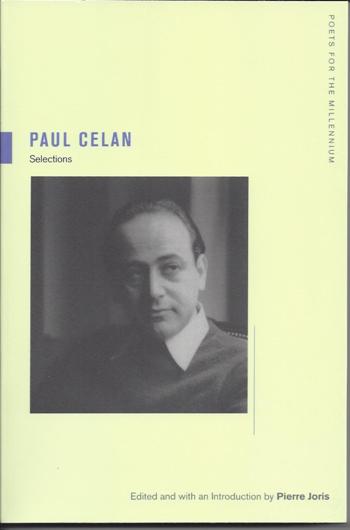
ENCOUNTERS WITH PAUL CELAN
E. M. CIORAN
Précis de decomposition, my first book written in
French,
was published in I949 by Gallimard. Five works of mine had been
published in
Romanian. In 1937, I arrived in Paris on a scholarship from the
Bucharest
Institut francais, and I have never left. It was only in I947, though,
that I
thought of giving up my native language. It was a sudden decision.
Switching
languages at the age of thirty-seven is not an easy undertaking. In
truth, it
is a martyrdom, but a fruitful martyrdom, an adventure that lends
meaning to
being (for which it has great need!). I recommend to anyone going
through a
major depression to take on the conquest of a foreign idiom, to
reenergize
himself, altogether to renew himself, through the Word. Without my
drive to conquer
French, I might have committed suicide. A language is a continent, a
universe,
and the one who makes it his is a conquistador. But let us get to the
subject.
...
The German
translation of the Précis proved
difficult. Rowohlt, the publisher, had engaged an unqualified woman,
with
disastrous resuits. Someone else had to be found. A Romanian writer,
Virgil Ierunca,
who, after the war, had edited a literary journal in Romania, in which
Celan's
first poems were published, warmly recommended him. Celan, whom I knew
only by
name, lived in the Latin quarter, as did 1. Accepting my offer, Celan
set to
work and managed it with stunning speed. I saw him often, and it was
his wish
that I read closely along, chapter by chapter, as he progressed,
offering
possible suggestions. The vertiginous problems involved in translation
were at that
time foreign to me, and I was far from assessing the breadth of it.
Even the
idea that one might have a committed interest in it seemed rather
extravagant
to me. I was to experience a complete reversal, and, years later, would
come to
regard translation as an exceptional undertaking, as an accomplishment
almost
equal to that of the work of creation. I am sure, now, that the only
one to
understand a book thoroughly is someone who has gone to the trouble of
translating it. As a general rule, a good translator sees more clearly
than the
author, who, to the extent that he is in the grips of his work, cannot
know its
secrets, thus its weaknesses and its limits. Perhaps Celan, for whom
words were
life and death, would have shared this position on the art of
translation.
In 1978,
when Klett was reprinting Lehre vom Zerfall
(the German Précis), I was asked to correct any errors
that might exist. I was
unable to do it myself, and refused to engage anyone else. One does not
correct Celan. A few months before he
died, he said to me that he would like to review the complete text.
Undoubtedly, he would have made numerous revisions, since, we must
remember,
the translation of the Précis dates
back to the beginning of his career as a translator. It is really a
wonder that
a noninitiate in philosophy dealt so extraordinarily well with the
problems
inherent in an excessive, even provocative, use of paradox that
characterizes
my book.
Relations
with this deeply torn being were not simple. He clung to his biases
against one
person or another, he sustained his mistrust, all the more so because
of his
pathological fear of being hurt, and everything hurt him. The slightest
indelicacy, even unintentional, affected him irrevocably. Watchful,
defensive
against what might happen, he expected the same attention from others,
and
abhorred the easygoing attitude so prevalent among the Parisians,
writers or
not. One day, I ran into him in the street. He was in a rage, in a
state
nearing despair, because X, whom he had invited to have dinner with
him, had
not bothered to come. Take it easy, I said to him, X is like that, he
is known
for his don't-give-a-damn attitude. The only mistake was expecting him.
Celan,
at that time, was living very simply and having no luck at all finding
a decent
job. You can hardly picture him in an office. Because of his morbidly
sensitive
nature, he nearly lost his one opportunity.
The very day
that I was going to his home to lunch with him, I found out that there
was a
position open for a German instructor at the Ecole normale supérieure,
and that
the appointment of a teacher would be imminent. I tried to persuade
Celan that
it was of the utmost importance for him to appeal vigorously to the
German
specialist in whose hands the matter resided. He answered that he would
not do
anything about it, that the professor in question gave him the cold
shoulder,
and that he would for no price leave himself open to rejection, which,
according to him, was certain. Insistence seemed useless.
Returning
home, it occurred to me to send him by pneumatique,
a message in which I pointed out to him the folly of allowing such an
opportunity
to slip away. Finally he called the professor, and the matter was
settled in a
few minutes. "I was wrong about him," he told me later. I won't go so
far as to propose that he saw a potential enemy in every man; however,
what was
certain was that he lived in fear of disappointment or outright
betrayal. His
inability to be detached or cynical made his life a nightmare. I will
never
forget the evening I spent with him when the widow of a poet had, out
of
literary jealousy, launched an unspeakably vile campaign against him in
France
and Germany, accusing him of having plagiarized her husband. "There
isn't
anyone in the world more miserable than I am," Celan kept saying. Pride
doesn't soothe fury, even less despair.
Something
within him must have been broken very early on, even before the
misfortunes
which crashed down upon his people and himself. I recall a summer
afternoon
spent at his wife's lovely country place, about forty miles from Paris.
It was
a magnificent day.
Everything
invoked relaxation, bliss, illusion. Celan, in a lounge chair, tried
unsuccessfully to be lighthearted. He seemed awkward, as if he didn't
belong,
as though that brilliance was not for him. What can I be looking for
here? he
must have been thinking. And, in fact, what was he seeking in the
innocence of
that garden, this man who was guilty of being unhappy, and condemned
not to
find his place anywhere? It would be wrong to say that I felt truly ill
at
ease; nevertheless, the fact was that everything about my host,
including his
smile, was tinged with a pained charm, and something like a sense of
nonfuture.
Is it a
privilege or a curse to be marked by misfortune? Both at once. This
double face
defines tragedy. So Celan was a figure, a tragic being. And for that he
is for
us somewhat more than a poet .
E. M. Cioran, "Encounters
with
Paul Celan," in Translating Tradition: Paul Celan in France, edited by
Benjamin Hollander (San Francisco: ACTS 8/9,1988): 151-52.
Is it a privilege or a curse to be marked by misfortune? Both at once. This double face defines tragedy. So Celan was a figure, a tragic being. And for that he is for us somewhat more than a poet .
Đặc quyền,
hay trù ẻo, khi nhận "ân sủng" của sự bất hạnh?
Liền tù tì cả
hai!
Cái bộ mặt
kép đó định nghĩa thế nào là bi kịch.
Và như thế, Celan là 1 hình tượng, một
con người bi thương.
Và như thế, ông bảnh hơn nhiều, chứ không "chỉ là 1 nhà
thơ"!
Triết Gia Của Sự Mất Ngủ
Trên tờ Books, có bài về
Philo, thú: Bằng cách nào Emil trở thành Cioran.
Khi ông ta viết, "tuổi
trẻ, ở đâu cũng thế, và luôn luôn là như vậy, thần tượng hóa, lý tưởng
hoá,
những tên đao phủ thủ”, ông nói về ông.
Cioran, là Thầy của CVD. GCC đoán thế, hình như anh có thừa nhận điều
này?
Và sau này, nếu CVD…sống sót, như… Murakami, thì có lẽ sẽ có 1 bài
viết, “Bằng
cách nào đao phủ thủ trở thành... dê tế thần”!
Hà, hà!
CVD lúc mới xuất hiện, cũng
trảm nhiều tác giả lắm, [trong số đó, có HH!]
Cioran là Thầy của NTV, cái này thì chắc chắn. Anh cũng chẳng thèm
chối, và còn
rất ư tự hào!
Nhưng theo GCC, NTV thua
thầy xa.
Thầy chán đời, mà để lại hằng hà tác phẩm.
Còn NTV, một con số không to tổ bố.
Nhớ, có lần ngồi đấu bia,
và tán láo, nghe GCC nhắc tới kỷ niệm về ông anh nhà thơ, và lời khuyên
của
ông, phải dịch, dịch, dịch, dịch tưới, đừng sợ sai, sai tới đâu sửa tới
đó,
không là không thể nào có tác phẩm… Anh buồn rầu than, giá mà hồi trẻ,
tao gặp
TTT, thì cũng đã có vô số tác phẩm rồi. Hồi đó, ngu quá, cứ sợ dịch sai!
Nhưng NTV cũng có chút an ủi. Khi anh dịch Cao Hành Kiện, TTT đọc, thú
quá,
phôn, khen, đúng giọng văn của tác giả Thằng Kình, tức Nguyễn
Đức Quỳnh.
NDQ cũng là Thầy của NTV. Anh có nhiều kỷ niệm về NDQ, giá mà viết ra
thì cũng
thú lắm. Thí dụ cái câu phán nổi tiếng của NDQ là GCC nghe qua NTV:
Quốc Gia thì như bát cơm hẩm, trộn cứt, VC thì như bát cơm gạo tám
thơm, trộn
thuốc độc.
Tuyệt cú!
Tuổi trẻ, ở đâu cũng thế,
và luôn luôn là như vậy, thần tượng hóa, lý tưởng hoá, những tên đao
phủ thủ.
Thảo nào tuổi trẻ Mít mê như điên Hoàng Phủ Ngọc Tường, chọn quốc ca là
thơ của
“hit man” VC.
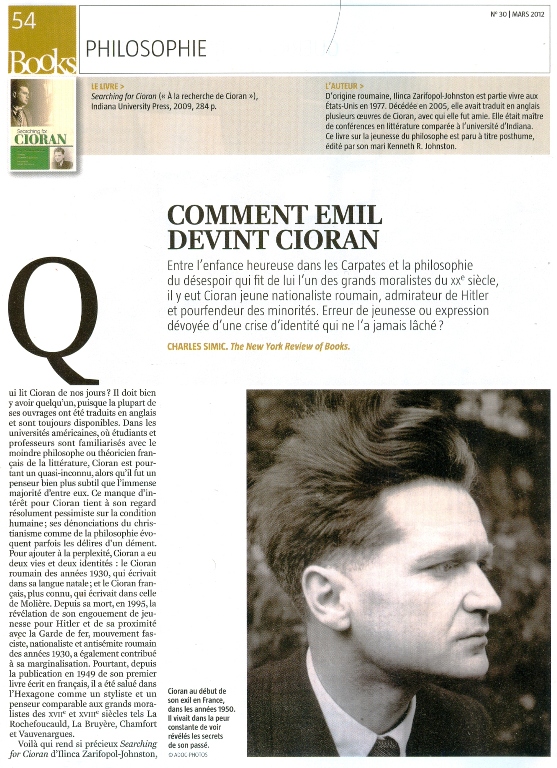
Không biết
CVD ngoài đời có đẹp giai như sư phụ? Tính về thăm hoài, và, nếu có
thể, xin...
phò, nhưng sợ VC đá đít như Thầy Kuốc.
Thăm “Sách
Huyền” nữa chứ.
Nhớ Hà Nội
quá!
Hà, hà!
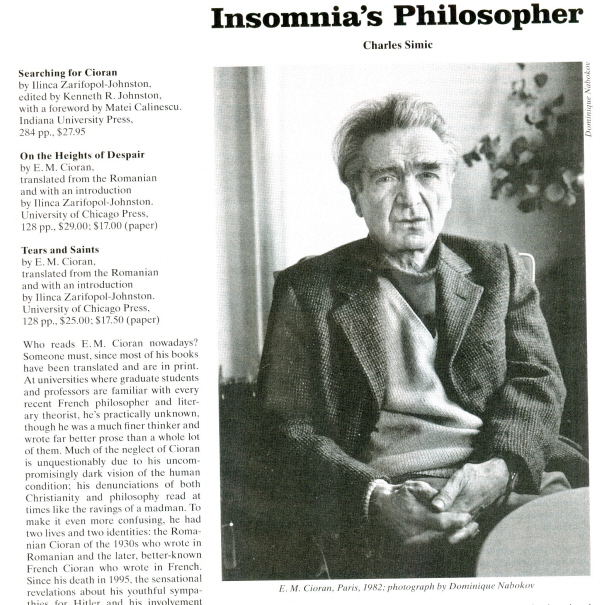

Không biết
CVD ngoài đời có đẹp giai như sư phụ? Tính về thăm hoài, và, nếu có
thể, xin...
phò, nhưng sợ VC đá đít như Thầy Kuốc.
Thăm “Sách
Huyền” nữa chứ.
Nhớ Hà Nội
quá!
Hà, hà!
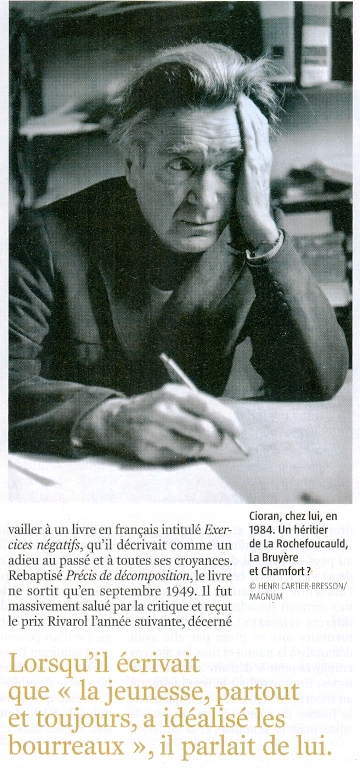
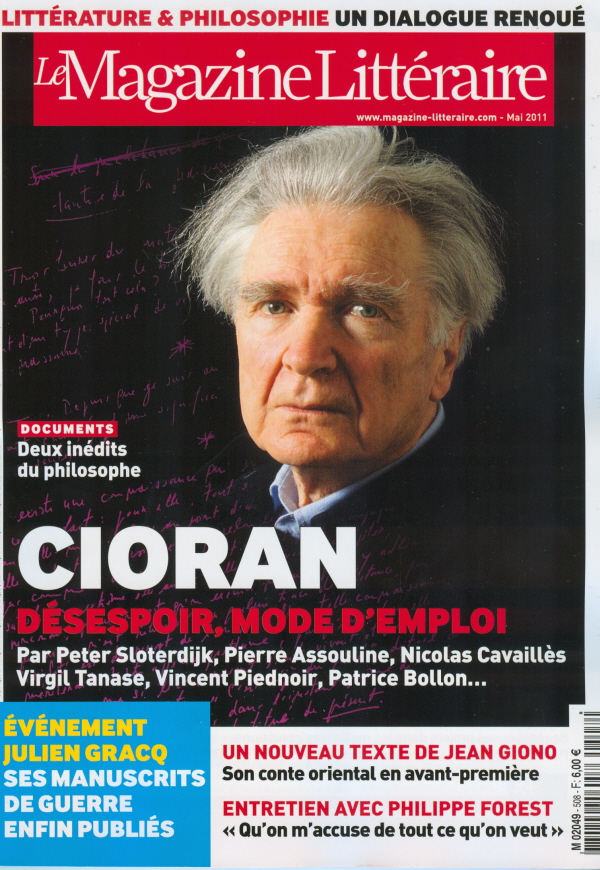
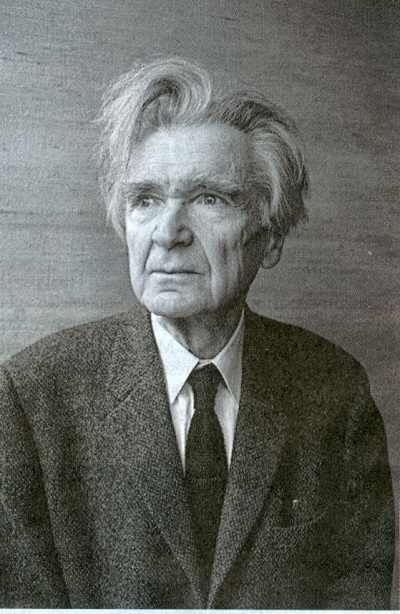
Who reads E.M. Cioran nowadays? Someone must, since most of his books have been translated and are in print. At universities where graduate students and professors are familiar with every recent French philosopher and literary theorist, he’s practically unknown, though he was a much finer thinker and wrote far better prose than a whole lot of them. Much of the neglect of Cioran is unquestionably due to his uncompromisingly dark vision of the human condition; his denunciations of both Christianity and philosophy read at times like the ravings of a madman. To make it even more confusing, he had two lives and two identities: the Romanian Cioran of the 1930s who wrote in Romanian and the later, better-known French Cioran who wrote in French. Since his death in 1995, the sensational revelations about his youthful sympathies for Hitler and his involvement with the Iron Guard, the Romanian pro-fascist, nationalist, and anti-Semitic movement in the 1930s, have also contributed to his marginalization. And yet following the publication in 1949 of the first book he wrote in French, he was hailed in France as a stylist and thinker worthy of comparison to great seventeenth- and eighteenth-century moralists like La Rochefoucauld, La Bruyère, Chamfort, and Vauvenargues.
This is what makes Searching for Cioran by the late Ilinca Zarifopol-Johnston, who didn’t live to finish her book, so valuable. It tells the story of his Romanian years and gives a fine account of the personal and political circumstances in which both his philosophical ideas and his brand of nationalism were formed. In later years, Cioran spoke rarely of that shameful period in his life and never—except to allude vaguely to his “youthful follies”—talked openly of his one political tract, Romania’s Transfiguration (1936), a short, demented book in which he prescribed how his native country could overcome its second-rate historical status through radical, totalitarian methods. Along with Mircea Eliade, the philosopher and historian of religion, the playwright Eugène Ionesco, and many others, equally eminent but less known abroad, he was a member of Romania’s “Young Generation,” the “angry young men” responsible for both a cultural renaissance and apocalyptic nationalism in the 1930s. To understand what led Cioran to leave Romania and become disillusioned with ideas he espoused in his youth, it’s best to start at the beginning.
Emil Cioran
was born in 1911, the second of three children, in the remote mountain
village
of Ra˘s¸inari near the city of Sibiu in southern Transylvania, which at
that
time was still part of the Austro-Hungarian Empire. His father,
Emilian, was a
Romanian Orthodox priest who came from a long line of priests, as did
his
mother, Elvira. He loved his native landscape with its streams, hills,
and
woods where he ran free with other kids, even telling one interviewer,
“I don’t
know of anyone with a happier childhood than mine.”
At other times, when not moved by nostalgia, he called …
Insomnia’s Philosopher
Searching for Cioran
On the Heights of Despair
Tears and Saints
Who reads E.M. Cioran nowadays? Someone must, since most of his books have been translated and are in print. At universities where graduate students and professors are familiar with every recent French philosopher and literary theorist, he’s practically unknown, though he was a much finer thinker and wrote far better prose than a whole lot of them. Much of the neglect of Cioran is unquestionably due to his uncompromisingly dark vision of the human condition; his denunciations of both Christianity and philosophy read at times like the ravings of a madman. To make it even more confusing, he had two lives and two identities: the Romanian Cioran of the 1930s who wrote in Romanian and the later, better-known French Cioran who wrote in French. Since his death in 1995, the sensational revelations about his youthful sympathies for Hitler and his involvement with the Iron Guard, the Romanian pro-fascist, nationalist, and anti-Semitic movement in the 1930s, have also contributed to his marginalization. And yet following the publication in 1949 of the first book he wrote in French, he was hailed in France as a stylist and thinker worthy of comparison to great seventeenth- and eighteenth-century moralists like La Rochefoucauld, La Bruyère, Chamfort, and Vauvenargues.
This is what makes Searching for Cioran by the late Ilinca Zarifopol-Johnston, who didn’t live to finish her book, so valuable. It tells the story of his Romanian years and gives a fine account of the personal and political circumstances in which both his philosophical ideas and his brand of nationalism were formed. In later years, Cioran spoke rarely of that shameful period in his life and never—except to allude vaguely to his “youthful follies”—talked openly of his one political tract, Romania’s Transfiguration (1936), a short, demented book in which he prescribed how his native country could overcome its second-rate historical status through radical, totalitarian methods. Along with Mircea Eliade, the philosopher and historian of religion, the playwright Eugène Ionesco, and many others, equally eminent but less known abroad, he was a member of Romania’s “Young Generation,” the “angry young men” responsible for both a cultural renaissance and apocalyptic nationalism in the 1930s. To understand what led Cioran to leave Romania and become disillusioned with ideas he espoused in his youth, it’s best to start at the beginning.
Emil Cioran was born in 1911, the second of three children, in the remote mountain village of Ra˘s¸inari near the city of Sibiu in southern Transylvania, which at that time was still part of the Austro-Hungarian Empire. His father, Emilian, was a Romanian Orthodox priest who came from a long line of priests, as did his mother, Elvira. He loved his native landscape with its streams, hills, and woods where he ran free with other kids, even telling one interviewer, “I don’t know of anyone with a happier childhood than mine.”
At other times, when not moved by nostalgia, he called it this “cursed and splendid paradise” where his people hid and slumbered for centuries, victims of the whims and slights of history, used to all kinds of masters. As Zarifopol-Johnston shows, “Cioran inherited at birth an ‘identity problem.'” In Transylvania, which was annexed by Austria in 1691, Romanians, who made up the majority of the population, were mostly peasants and serfs dominated by the Hungarians and Germans, and reduced to the status of “tolerated population” under the Empire. Their struggle for political rights made Transylvania and Ra˘s¸inari a hub of organized national resistance. Both of Cioran’s parents spent time as political prisoners in Hungarian concentration camps because of their Romanian nationalist sympathies. No wonder their son felt free to roam; his parents were in prison.
Humiliations, Cioran later said, are the hardest things to forget. If Ra˘s¸inari was a place of lost happiness, Sibiu—the town where his parents sent him to middle school at the age of ten and where for the next eight years he lived, first alone in a boardinghouse and later with his parents when they themselves moved there—was worlds apart with its Central European architecture, its fine parks, schools, and libraries, and its genteel, bourgeois life. He was not an especially outstanding student, yet he read widely, devouring Shakespeare, Novalis, Schlegel, Pushkin, Tolstoy, Turgenev, Rozanov, Shestov, and Dostoevsky, whom he admired above all the others. What better reading could there be for a rebellious youth—who had already refused to say grace with the family before dinner and left the table while they prayed—than Notes from Underground, in which Dostoevsky writes:
I was nothing but a fly before all that fine society, a revolting, obscene fly—more intelligent, more cultivated, nobler than anyone else, that went without saying, but a fly nonetheless, forever yielding the way to everyone, humiliated and insulted by everyone.
Although Cioran’s parents were a highly respected middle-class couple connected by marriage to many old and illustrious families in Transylvania—his father a newly appointed archpriest and adviser to the Metropolitan bishop of Sibiu and his mother the head of the Christian Women’s League—their son felt like a lost soul, a stranger in his own surroundings. The years in Sibiu were a prelude to what was going to be a lifelong identity crisis made worse by his susceptibility to chronic insomnia, from which he started suffering when he was seventeen. The only escape was in books and, when he was older, in long walks at night through the empty and silent streets of Sibiu. The town boasted of three well-established brothels where young Emil became a regular customer, once carrying in his pocket a copy of Kant’s Critique of Pure Reason and meeting there not only his schoolmates but also his teachers. Still, he continued to be plagued by his secret, mysterious illness—an insomnia, he later said, that would make a martyr envious—which affected all his thinking, set his nerves on edge, and made him constantly irritable. Years later he was to say that he wrote all his books during his nightly walks and while lying in bed unable to sleep.
In Bucharest, where he went next to study philosophy at the university in 1928, he slept even less. Luckily for him, he could flee his cold, drab little room by reading fifteen hours a day at the library of the King Carol Foundation, situated on the city’s main thoroughfare right across from the royal palace. He had come to the capital at a time of great political ferment. The liberal party, responsible for political stability and economic prosperity after the creation of Greater Romania in 1918, was shaken by the European-wide economic crisis, local strikes, and violent student protests, as well as the rise of a pro-fascist movement, the Iron Guard, which competed with the King for power.
For Cioran, reading in a library of a country in chaos with its mixed population of Romanians, Hungarians, Jews, Slavs, Greeks, Russians, Bulgarians, and Turks, with their half-Eastern, half-Western ways, the conviction that each man is alone, forced to find his own meaning in a meaningless universe, became even stronger. Stiff and awkward in his shabby dark suit, with a slightly pudgy face, piercing green eyes, and a permanent scowl furrowing his forehead, he spoke with a Transylvanian accent and kept to himself. “I’ve been for three years here in Bucharest and no one knows me, because I haven’t tried, certainly,” he wrote to a friend.
He was exaggerating. At university, he attended the seminars of the philosophy professor Nae Ionescu, a charismatic figure responsible for introducing to his students a religiously inspired, messianic nationalism. There he met many of the men who were to have a leading part in undermining the democratic state by rejecting the ideas of liberalism and eagerly replacing them with totalitarian ones. As Marta Petreu writes in An Infamous Past: E.M. Cioran and the Rise of Fascism in Romania, redemption through death-sacrifice in the name of the nation became the leading idea of the far right. “We were a bunch of wretched idiots,” Eugène Ionesco later said.1
Cioran’s turn at being a political idiot was still to come. Although he was preparing an undergraduate thesis on Henri Bergson, the kind of philosophy he favored was that of attack and provocation in the manner of Nietzsche. He rejected the Cartesian belief in the primacy of the intellect and reason in man and therefore had no interest in abstract speculation about the nature of being or truth. Like Schopenhauer, he abhorred the strain of optimism in thinking about history and human society and pictured mankind as doomed to an eternal round of torment and misery. Most philosophers, he claimed, pretend that insoluble problems do not exist. They have no courage to face their inner doubts and to admit that they lead an existence full of irreconcilable contradictions. In his first book, On the Heights of Despair, published in Bucharest in 1934 when he was twenty-three, he wrote:
I like thought which preserves a whiff of flesh and blood, and I prefer a thousand times an idea rising from sexual tension or nervous depression to an empty abstraction. Haven’t people learned yet that the time of superficial intellectual games is over, that agony is infinitely more important than syllogism, that a cry of despair is more revealing than the most subtle thought…?
Man, for Cioran, is an unhappy beast banished from the animal kingdom with just enough imagination to make his life miserable. His quarrel with philosophers is that they ignore the reality of the body, that most terrible of all realities, and its mental and physical pain. He is closer to a poet like Baudelaire, who kept insisting that the hell he found himself in was representative of the human condition:
How could the actor of a complicated drama of the soul in which, all at once, erotic anticipation clashes with metaphysical anxiety, fear of death with desire for innocence, total renunciation with paradoxical heroism, despair with pride, forebodings of madness with longings for anonymity, screams with silence, aspiration with nothingness—how could he still go on philosophizing in a systematic way?
How, indeed? Cioran tackles all the major philosophical themes in his writings, but from that anguished, personal angle. Despite passages of Romantic bravado and self-pity undercut by his cynicism and black humor, On the Heights of Despair is a book of breathtaking ambition and courage. Made up of sixty-six chapters, most of them no longer than a couple of pages, it explores morality, love, evil, passion for the absurd, obsession with the absolute, suffering, melancholy, time and eternity, solitude and death, in formulations that are both incendiary and have a depth and originality astonishing in someone so young. The book was awarded the prestigious young authors prize by the King Carol Foundation in the literature and arts category. Its recipient, in the meantime, was in Germany on a Humboldt fellowship, given by its government to promising students from abroad, studying first in Berlin and then in Munich. His declared purpose was to pursue his doctoral studies, but he failed to attend a single class in both places.
Cioran was in Germany from November 1933 to July 1935. In the less than two years that he spent there, he wrote and sent back to Romania for publication many pieces on his impressions of the country. His detractors emphasize the passages in which he is most uncritically enthusiastic about the new Nazi regime, and his defenders seek to ignore them or to minimize their importance. Some, though not all, appeared in right-wing publications. Many are political, but most are not. Still, in a piece from July 15, 1934, Cioran announced that “there is no politician today who inspires me with greater sympathy and admiration than Hitler,” and continued to argue that the Führer’s mystique in Germany was totally justified.
His merit, Cioran amazingly claimed, consisted in his having stolen the critical spirit of the nation with his capacity to seduce. This, he further stated, was “the dramatic destiny and responsibility of any visionary, dictator, and prophet.” What he witnessed both enchanted and horrified him and made him ponder the fragility of the instinct of liberty in mankind. Human beings, he told his readers, both aspire to liberty and exult each time they lose it. He saw Germans raise their hands toward their leader, asking impatiently to be enslaved and to be led to their collective ruin.
Although he was never a mindless enthusiast for Hitler, as Zarifopol-Johnston shows, he was something even worse. While he saw clearly what was happening in Germany, he had a strange affinity for things he otherwise detested. He persuaded himself that only such monsters can lead nations to greatness. He thought Romania needed just such a leader to lift it out of its backwardness, while at the same time openly declaring on another occasion that he found it impossible to feel any theoretical enthusiasm for dictatorship. His next book, Romania’s Transfiguration, was an attempt to demonstrate, against his better judgment, how such transformation ought to be accomplished. It is a work of which he was ashamed all his life, although just before his death, and already suffering from Alzheimer’s disease, he allowed it to be republished in Romania minus its two most offending chapters.
In her fine and detailed study of this foolish book, Marta Petreu cleverly observes that Cioran always made sure that his position on any given subject was his alone; consequently, he didn’t fail to revile a single ethnic group in Romania. His objection to foreigners and to Jews in particular was that they were inhibiting the emergence of the Romanian nation. However, unlike the intellectuals associated with the Iron Guard who blamed the Jews for all of Romania’s failures, he regarded them as superior to Romanians, who were solely responsible for their own ills. As for the Hungarians, he confessed to his “absolutely natural national hatred” of them mixed with “tenderness toward this incomplete people” who ruled Romania for a millennium.2 Romania’s Transfiguration is a work of a nationalist contemptuous of his own people, a fanatic without a racial doctrine.
The book was not well received among the Iron Guard leaders and its intellectuals because, I suspect, its author hinted that he had his own purposes. If he wanted to see the world turned upside down, it was because he wanted to assuage his own religious and metaphysical despair. As he wrote in “Deception Through Action,” an article published in December 1940 after the Iron Guard had entered the government:
In order to improve the situation of a nation or of a social category, some are willing to make the supreme sacrifice. Still, they do not make it for the sake of that particular nation or social category, but rather because life would be unbearable without the vibrations unleashed by those pretexts…. The need to tear everything down and rebuild it comes from an emptiness that can no longer live with itself.
This is a vile confession coming from a man who expressed wariness in his first book about supporting any political movement. And yet, he did. He wrote a few more execrable articles supporting right-wing causes after he left in 1937 for Paris, where, except for one short visit home in 1940, he was to remain for the rest of his life. One of his pieces at the time accused the older generation of senility, moral decay, and betrayal of national interests and claimed that the parliamentary system instituted by them had demoralized the nation and that any means of destroying it would be legitimate. One newspaper concluded that this was instigation to murder, and asked the Justice Ministry to take action. Nothing came of it, but that scandal and the unsettled political situation in Romania, where King Carol II had abolished all political parties and arrested the leaders and some of the intellectuals associated with the Iron Guard, made him want to prolong his stay in France.
His next book, Tears and Saints, which was published at his own expense after the publisher became worried by its blasphemous contents and appeared while he was already out of Romania, was not well received either, though this had nothing to do with politics. Friends and critics were appalled by his treatment of Christianity. Conceived back in Sibiu, when Cioran pored over the lives of mystics and saints in one of the town libraries, the book is a brilliant meditation on religious ecstasy by a man who confessed that even while he read and admired the lives and writings of these men and women, he could not bring himself to believe in God.
Still, the self-inflicted suffering of saints and religious mystics, the ways they would bury their sufferings in silence and absence, moved him immensely. He preferred pure mystics, mostly lay and mostly female, a family of existential outcasts whom he called “God’s insomniacs,” whose approach to the Christian faith was antitheological and anti-institutional, and whose one wish was to defeat time and the individual ego while denying the world of appearances. Compared to philosophy, he thought, their mystical revelations give precise answers to questions that philosophers do not even dare consider. “There is no heat except near God. That’s why the Siberia of our souls clamors for saints,” he writes. As for his own lack of belief, in his view both skepticism and mysticism are expressions of our despair at our lack of knowledge.
This book, like most of Cioran’s future works, is a collage of short paragraphs recalling both Schlegel’s and Nietzsche’s philosophical fragments. Like his predecessors he is capable not only of great insights, but also of irreverent and marvelous flights of fancy:
The only explanation for the creation of the world is God’s fear of solitude. In other words, our role is to amuse Our Maker. Poor clowns of the absolute, we forget that we act out a tragedy to enliven the boredom of one spectator whose applause has never reached a mortal ear. Solitude weighs on God so much that he invented the saints as partners in dialogue.
The greatest piece of good luck Jesus had was that he died young. Had he lived to be sixty, he would have given us his memoirs instead of the cross. Even today, we would still be blowing the dust off God’s unlucky son.
The beating of our heart threw us out of paradise; when we understood its meaning we fell into Time.
All the sages put together are not worth a single one of Lear’s curses or Ivan Karamazov’s ravings.
Cioran’s participation in political life in Romania lasted eight years. Gradually, after moving to France, he lost interest in politics. Unlike other intellectuals of his generation who held various positions in the diplomatic services during the war, the one job he got at the Romanian legation in Vichy lasted from February 1 to May 16, 1941. It’s not clear whether he quit the minor position he held or was fired after he had an argument with his superiors. He never worked again anywhere. He lived in Paris on a scholarship from the French government, the money his parents sent him, and gifts and loans from well-to-do friends, striving to remain true to his ideal of an eternal parasite.
Simone Boué, a Frenchwoman whom he met in 1942 and with whom he stayed till his death, also helped. She was a teacher of English and occasional translator and must have had some income. They lived in small hotels, ate at university student restaurants and even high school cafeterias, and didn’t have an apartment until 1960, when they moved into a modest one in the attic of a building on the Left Bank, where they were to stay for the rest of their lives.
In December 1946, Cioran mentioned in a letter that he had been working on a book in French called Exercices négatifs, a work he described as a farewell to the past and to all faiths. The book, renamed A Short History of Decay, didn’t come out until September 1949. It was lavishly praised by reviewers and received the Rivarol Prize the following year by the unanimous decision of a distinguished committee made up of André Gide, Jules Romain, Jules Supervielle, and Jean Paulhan. More importantly, it gave Cioran a new identity as a French writer, although one living in constant fear that the secrets of his past would come to light. The book addresses his fanaticism in those years, though indirectly, without saying anything about his own biography or making any specific reference to the recent war and the death of millions of innocent human beings:
History is nothing but a procession of false Absolutes, a series of temples raised to pretexts, a degradation of the mind before the Improbable. Even when he turns from religion, man remains subject to it; depleting himself to create fake gods, he then feverishly adopts them: his need for fiction, for mythology triumphs over evidence and absurdity alike…. Scaffolds, dungeons, jails flourish only in the shadow of a faith—of that need to believe which has infested the mind forever. The devil pales beside the man who owns a truth, his truth…. In the fervent mind you always find the camouflaged beast of prey; no protection is adequate against the claws of a prophet….3
There have been some who have doubted the sincerity of Cioran’s change of heart. I do not, and neither do Ilinca Zarifopol-Johnston and Marta Petreu, who know both his Romanian and French writings well. When he wrote, “Youth, always and everywhere, has idealized executioners, provided they perform their task in the name of the vague and the bombastic,” he was describing himself.4
What still needs to be better known are the rich philosophical and literary contents of the nine books he subsequently wrote (all splendidly translated from the French by Richard Howard), along with their sharp criticism of philosophers from Plato to Heidegger, and his essays on history, tyranny, utopia, Russia, and many other subjects, as well as on figures like Joseph de Maistre, Valéry, Beckett, Borges, and Scott Fitzgerald. Cioran was interested in everything. He wrote about music he heard on the radio, his views of many books he had read, his never-ending fascination with Taoism and Buddhism, his love of poets like Shelley and Emily Dickinson, and his conversations with prostitutes he encountered on his late-night walks through Paris. What these later books show is how much he grew and changed as a thinker, what he kept and what he discarded from his youth, as he went on living his quiet life, refusing every award and honor that came his way.
Letters
Ionesco Was Not a Nationalist December 23, 2010
-
1
Translated from the Romanian by Bogdan Aldea, with a foreword by Norman Manea (Ivan R. Dee, 2005), p. 58. ↩
-
2
Petreu, An Infamous Past, p. 141. ↩
-
3
A Short History of Decay, translated from the French by Richard Howard (Richard Seaver/Viking, 1975), pp. 3–4. ↩
-
4
E.M. Cioran, Anathemas and Admirations, translated from the French by Richard Howard (Arcade, 1991), p. 148. ↩

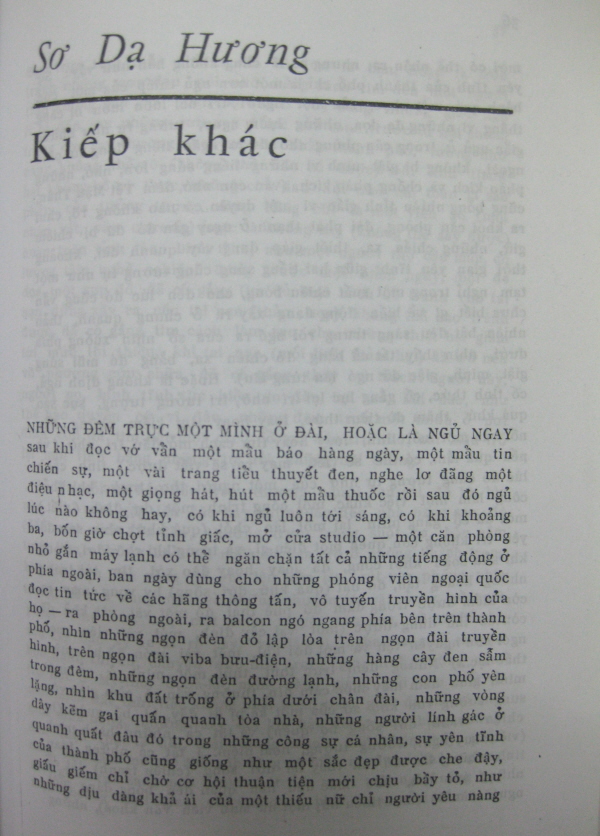

Comments
Post a Comment